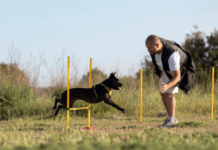Last Updated on October 16, 2024 by Dogs Vets
Guide dogs play an essential role in helping individuals with disabilities, particularly those who are visually impaired, lead more independent lives. These dogs are not only companions but also act as the eyes of their handlers, navigating various environments and ensuring their safety. For a dog to succeed in this critical role, certain traits are non-negotiable—most notably trainability and intelligence. These two characteristics are at the heart of what makes guide dogs reliable, effective, and safe for their handlers.
While many breeds exhibit intelligence, not all dogs possess the high level of trainability required to be a successful guide dog. The process of training a guide dog is extensive and rigorous, involving obedience training, adaptability in new environments, and an understanding of complex commands. Dogs that excel in these areas are able to provide a level of service that enhances the quality of life for their handlers.
The Importance of Trainability in Guide Dogs
Trainability is a cornerstone trait for any guide dog. A dog that is easily trained is more likely to understand and execute commands consistently, which is crucial when assisting a person with disabilities. Guide dogs need to be trained to recognize obstacles, react to various stimuli, and stop or guide their handler in potentially dangerous situations. Dogs with high trainability can quickly learn and retain these necessary skills, making them reliable in everyday tasks.
Moreover, a dog’s ability to follow commands without hesitation is vital in ensuring the safety of the handler. Whether it’s navigating through crowded areas or crossing busy streets, a guide dog must be able to respond immediately to instructions. This high level of obedience minimizes the risk of accidents, helping the handler avoid potential harm.
Intelligence and Problem-Solving Abilities
Intelligence is equally important for a guide dog’s success. Intelligent dogs are capable of understanding complex commands and can adapt to new environments or unexpected situations. This adaptability is key for guide dogs, as they often face varying and unpredictable challenges when out in public. For example, they need to problem-solve when an obstacle blocks a familiar route or when the environment changes unexpectedly, such as during construction or road closures.
A dog with strong problem-solving skills can make decisions in real-time that keep both the handler and the dog safe. This trait ensures that the dog can guide their handler effectively, even when facing unusual or dangerous circumstances. Without intelligence and the ability to think critically, a guide dog might struggle to keep their handler safe.
Socialization and Behavioral Stability
While trainability and intelligence are fundamental traits, a guide dog must also have excellent socialization and behavioral stability. Guide dogs frequently interact with people and other animals in public settings. Dogs that are well-socialized and exhibit calm behavior can handle these interactions without becoming distracted or aggressive.
Poorly socialized dogs may react unpredictably in stressful situations, which could lead to dangerous incidents, including bites. In severe cases, such as serious injuries from a dog bite, both the handler and the dog could face legal consequences. Therefore, ensuring that guide dogs are socialized properly and exhibit stable behavior is essential for their success in public settings.
Adaptability to Different Environments
Guide dogs need to be adaptable to a wide range of environments, from busy urban streets to quiet suburban neighborhoods. An adaptable dog is able to remain focused and calm, even when the surroundings are noisy, crowded, or unpredictable. Dogs that are easily distracted or nervous in new environments may not make good guide dogs, as they might fail to provide the steady and reliable guidance that handlers need.
Training programs emphasize adaptability by exposing guide dogs to a variety of environments during their training. This exposure helps them learn how to navigate different scenarios confidently and ensures they can continue to perform their duties regardless of where they are.
Communication Skills and Understanding Commands
A guide dog’s ability to communicate effectively with their handler is another crucial trait. Communication between the dog and handler is essential for both parties to work together efficiently. Dogs must be able to understand not only basic commands but also more advanced instructions related to safety and navigation. Similarly, the handler must be able to communicate their needs to the dog clearly.
A guide dog that can understand a wide range of verbal and non-verbal cues is better equipped to assist its handler in day-to-day tasks. Clear communication allows for smoother navigation and enhances the overall trust between the dog and handler, which is vital for the partnership’s success.
Obedience and Consistency
Consistency in obedience is a key trait for guide dogs. Even a momentary lapse in obedience could lead to accidents or injuries. Guide dogs must consistently obey commands, even in distracting or stressful situations. A dog that can maintain focus and obedience under pressure is invaluable, as their handler relies on them for safety in every situation.
Training programs for guide dogs place a significant emphasis on obedience, reinforcing positive behaviors and ensuring that the dog can perform commands reliably. The ability to stay calm, focused, and obedient at all times ensures that the dog can serve as a dependable guide for its handler.
Emotional Support and Bonding
Finally, the emotional bond between the guide dog and its handler is a crucial aspect of the relationship. Guide dogs not only provide physical assistance but also emotional support. A dog that is in tune with its handler’s emotional state can offer comfort in stressful situations, helping to reduce anxiety and build confidence. This bond also strengthens the trust that is necessary for the handler to rely on the dog completely.
Dogs that are emotionally intuitive can sense when their handler is stressed or anxious, offering comfort through their presence and actions. This emotional support helps to create a stronger working relationship between the guide dog and the handler, making the partnership more effective. Over time, this bond not only enhances the guide dog’s ability to assist but also deepens the handler’s sense of security and independence.























